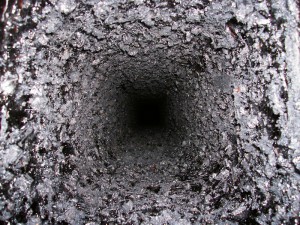Why Does My Chimney Stink?
 During the summer, when we have hot, humid weather or lots of rain, you may notice an undesirable smell coming from your fireplace and chimney. This odor can be caused by a variety of reasons. Let’s explore some of the most common types of smells and the likely cause.
During the summer, when we have hot, humid weather or lots of rain, you may notice an undesirable smell coming from your fireplace and chimney. This odor can be caused by a variety of reasons. Let’s explore some of the most common types of smells and the likely cause.
- An asphalt or bad barbeque smell is probably due to creosote buildup. Creosote is a foul-smelling, flammable, corrosive substance that’s a byproduct of the wood-burning process.
- A musty odor may be from rain water, ice or snow that’s gotten inside your smoke chamber, creating a moist environment.
- A rotten, earthy smell could be from fallen leaves or other natural debris that’s gotten inside your chimney and combined with damp soot, and is now rotting.
- A rotten smell of decomposition is likely from an animal that’s gotten inside your chimney and died or left animal scat.
If you have odors coming from your fireplace and chimney, contact the professionals at T.J.’s Chimney Service of Greenfield, IN. We can find the source of the smell and make recommendations for eliminating the odor.
Some solutions may be to:
- Have your chimney professionally cleaned. Our chimney sweeps will remove any creosote buildup and decomposing leaves, animal nests and droppings, or dead animals. A professional chimney cleaning should eliminate most smells coming from your chimney. However, sometimes, creosote can soak into your chimney walls and may continue to smell some.
- Have the professionals at T.J.’s Chimney Service install a top-mounted damper or chimney cap to the top of your chimney to keep rain and moisture out. Also, dampers and chimney caps will keep falling leaves and animals from getting into your chimney as well.
- Correct negative air pressure in the home. Typically, chimney draft pulls any odors inside your chimney up the flue and away from the inside of your home. But if your home has a negative pressure issue, the smelly air can flow back into your home. This problem is often in found in newer, tightly sealed homes or when venting changes have been made. Some typical causes of negative air pressure are exhaust fans, central vacuum, additional chimneys, combustion appliance flues, range hoods and the installation of other household appliances. To correct negative air pressure in the home, you can: a) Keep a window cracked at all times to reduce the pressure; b) Close the fire damper when you’re not using your fireplace; and c) Have the professionals at T.J.’s Chimney service install a tight sealing, top-mounted damper onto the top of your chimney to reduce the airflow that comes down your chimney.

